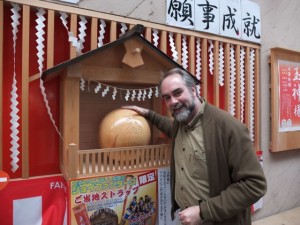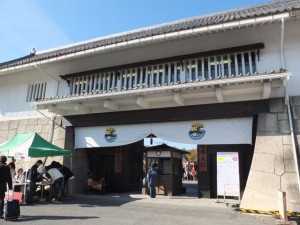I’ve been watching the The Guild – a web series about gamers. It was launched in 2007 on YouTube and shows what can be done with a web series. Written by Felicia Day it chronicles the real and online lives of a guild of MMORG players. It apparently was one of the inspirations of Dr. Horrible’s Sing-Along Blog another great web series. They both use a series of short episodes suitable for web streaming to do comedy.
Category: Computer Games
Akihabara: Otaku Holy Land

If you are interested in Japanese otaku culture you have probably heard about Akhihabara or Akiba for short. Akiba is a neighbourhood of Tokyo famous for electronics shops, game shops, maid cafés and arcades. I was lucky to get a tour of Akiba by Michiya Kawajiri and Kiyonori Nagasaki on November 30th, 2011. Akiba is similar to Osaka’s Nipponbashi neighbourhood, but larger and with maid cafés. You can see my photos of Akihabara on Flickr.
Game changers: the women who make video games
The Guardian has a welcome story on Game changers: the women who make video games. The story contrasts the statistics for the UK that show 49% of game players are women with the stats on game developers (12% are women.) It then profiles a number of women game developers and discusses some of the barriers.
Interview with Akira Baba
On December 1st I met with Akira Baba who was the founding President of DiGRA Japan [Japanese]. He is a professor at the Graduate School of Interdisciplinary Information Studies and a member of the Interfaculty Initiative in Information Studies at the University of Tokyo. The meeting was set up by Kiyonori Nagasaki who is in the same interdisciplinary faculty and we had a student who translated for professor Baba. Our conversation revolved around the challenges of university/industry engagement.
Japanese Game Centres (Arcades)
Arcades are still popular in Japan and they offer a gaming experience different from the small arcades in airports in Canada. Associate Professor Keiji Amano and his wife took me for a tour of arcades in Nagoya on November 25th and commented on a draft of this post. We visited a variety of arcades including a Pachinko parlour, a floor of claw and crane games in an arcade complex along with a floor of “hard-core” arcade games, and a family oriented arcade in a shopping mall. We also visited a large shop to check out fan dojinshi manga and a card trading/play shop. I’ve posted my photos in a set on Flickr with some comments.
Continue reading Japanese Game Centres (Arcades)
Live at Return of the Magic
Shane and Shannon were on breakfast television promoting the locative game they developed called Return of the Magic Live at Return of the Magic #3 and Live at Return of the Magic #4. This uses SCVNGR and is supported by GRAND. They worked with the Old Strathcona Business Association to create this game with prizes.
Game Industry Legends: Richard Garriott de Cayeux
From Slashdot I found my way to a nice long interview with Game Industry Legends: Richard Garriott de Cayeux. Also known by his in-game name Lord British designed games like the Ultima series from Origin Systems that he founded with his brother and father.
In the interview he talks about designing games and the research he feels you have to do.
My process is very labor-intensive, it’s a very research-oriented approach to game design. I consider myself a student of the Tolkien style of fictional development, and yet virtually no one even in my own company, having heard me expound on this for years and years and years, will put in the long nights and weekends of study in order to come up with something that is of similar power.
He also speculates that consoles are doomed because of the power of the smartphones and tablets that we carry around.
If we’ve got a smartphone that can do Xbox level graphics, which we’ve almost got, and I can hook that up to a TV and use a controller, what’s the difference between that and a console? It’s just whatever games are available.
Uzumasa Sengoku Festival
On November 26th I visited the Toei Kyoto Studio Park for the Uzumasa Sengoku Festival. I’ve posted my photographs here. The Toei Park is cinema theme park with sets that are still used along with all sorts of activities for visitors like a Ninja show. It is a bit of tourist trap, but that is part of its charm for those who want to be photographed in “authentic” settings as you will see. The Uzumasa Sengoku Festival is a two-day festival dedicated to Japanese Warring Period transmedia (manga, anime and games) which made is a perfect venue to study the interplay between media and/for fans. For the festival there was a pavillion dedicated to gaming where local game companies had booths, there were special events and some of the houses in the “historic” Kyoto setting were used by companies to promote new products about popular warring period anime and related media. Above all the cosplay (costume play) fans came out in droves to pose for pictures in the recreated streets of old Kyoto.
Continue reading Uzumasa Sengoku Festival
How videogames will change the world
The University of Alberta Faculty of Arts has written a nice little story/interview about our Humanities Computing graduate students working on computer games called, Student View: How videogames will change the world.
Downturn in the Japanese Game Industry
Much of the discussion around the games industry here in Japan is taken up by the difficulties big companies like Nintendo are going through. Given that the big companies dominate the scene and that game studies here pay a lot of attention to industry, this means that most discussions with games researchers eventually circle around to the downturn in the industry and what Japan can do about it. But, what exactly is the problem with the Japanese games industry? Here are some of signs that worry games researchers here:
- Smart-phones are replacing dedicated mobile game systems like the Nintendo DS and the Sony PSP in terms of game sales. A story in the Globe and Mail points to a blog entry by Flurry blogger Peter Farago asking Is it Game Over for Nintendo DS and Sony PSP? (Nov. 9, 2011) The is based on US data that shows that between 2009 and 2011 Nintendo and Sony went from owning 81 % of the portable game software market to only 42% of the market.
- Nintendo posted its first ever loss. Nintendo is losing money as reported in a story in the Globe by Yoshiyuki Osada and Isabel Reynolds, Nintendo to post first every annual net loss. On Thursday, Oct. 27th, 2011 Nintendo said it expected its first annual loss ever and attributed it to weak demand for the 3DS (due partly to lack of games that exploit the 3D) and a strong yen (which affects Nintendo because a large percentage of their sale are exports.)
- Japanese game developers seemed to be slow to take advantage of the emerging markets of social games and casual games. Japan’s largest social network Mixi, for example, doesn’t seem to be gaining members and their operating profit is dropping. Most developers seem to be designing games only for the Japanese market leaving the global market to others. Only recently is DeNA moving their Mobage gaming network to Android and iOS and the Android version isn’t getting good reviews.
There is another side to the story. As Ashton Raze puts it in a the Telegraph Super Mario 3D Land review (Nov. 18, 2011),
While current talk of Nintendo is often mired in share prices and falling stocks, it’s easy to forget that they also make games like this; joy-filled, effortless romps, pure blue-sky gaming that can easily be hailed as the reason to own a given system.
Nintendo has also been here before. Osamu Inoue in a somewhat enthusiastic book Nintendo Magic documents how Satoru Iwata (the current president of Nintendo) led the company to record profitability after the poor performances of the Virtual Boy, N64, and GameCube. Eventually they got it right with the DS and Wii. Nintendo has the cash reserves and creativity reserves to weather poor years and systems that aren’t hits. The question is whether a strategy of focused on selling tightly coupled systems and software will work now that smartphones are powerful enough to be mobile systems, and gamers are moving to casual social games and large-scale virtual game worlds all playable on PCs? Who needs dedicated mobile systems or consoles?
Some of the questions that come up when we discuss the perceived downturn are:
- Is there really a problem? What is the scale of the downturn? Is it the Japanese game industry in general or particular companies like Nintendo or just a strong yen?
- What are the causes of the downturn? Is it due to a failure to anticipate new gaming models from MMORGs to social games? Is it due to conservative thinking by management in the industry? Is it due to a dominance of console/system thinking? Is it due to a strong yen or poor global business strategies? Or is it due to a shrinking population of new players and developers?
- What can government do to help? The Japanese government has traditionally not supported their manga/anime/game industries the way they were involved with other industries. There are signs the government is now getting involved – is that a good thing? Does coordinated planning work?
- What are Japan’s strengths? What can they build on to resurrect the games industry?
- What role can the academy play in this? What should be taught? What sort of research would benefit the industry?
- What should be next for the games industry in Japan? Should they keep on doing what they do best or should they refocus? How can industry, academy and government together reinvigorate the export industry?


